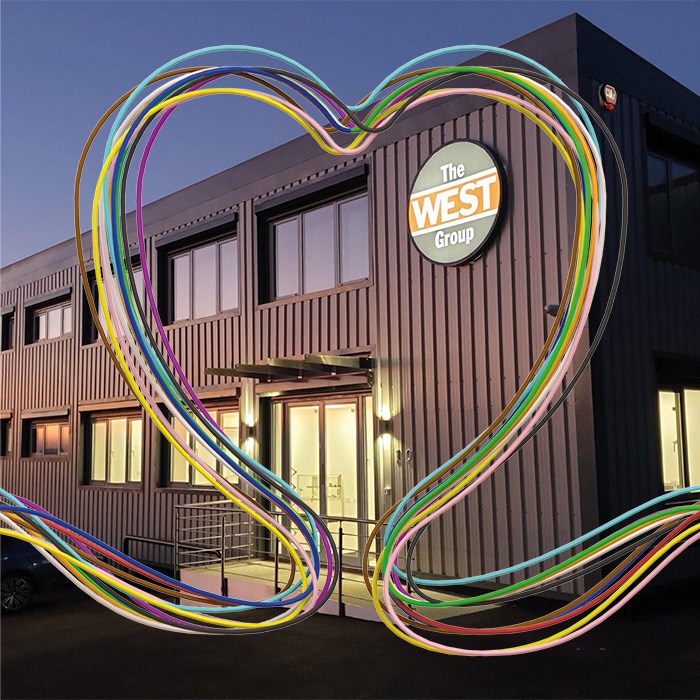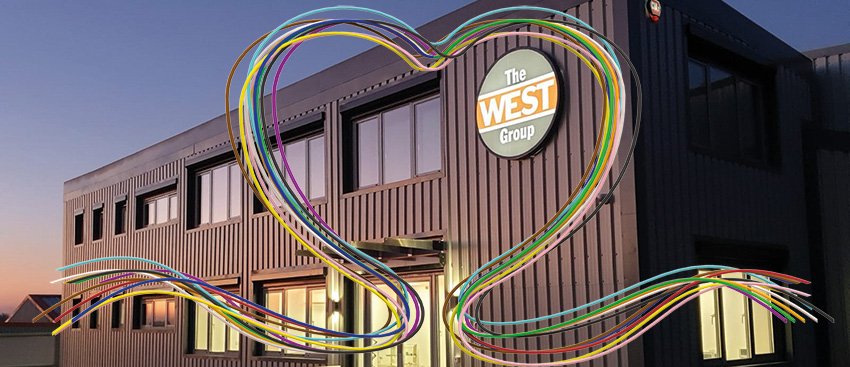Pride Month at TWG
Published date: 29 Jun 2023


June is Pride month globally which gives us a chance to highlight and celebrate the profound influence of the entire LGBTQIA+ acronym on our rights, communities, workplaces, and society as a whole. During Pride Month it is a chance to globally celebrate diversity and the LGBTQIA+ communities’ right to live how they choose without fear of discrimination in or out of the workplace.
Why do we celebrate Pride Month at TWG?
At The West Group, we are incredibly proud of the diversity of our staff. TWG is proud to be an equal opportunities employer and we encourage all our staff to have the confidence and freedom to be their true authentic selves at work. At TWG we are passionate about supporting and celebrating our LGBTQIA+ colleagues throughout Pride Month and beyond, and we recognise and celebrate the intrinsic value our LGBTQIA+ community offers the workplace on a daily basis.
Elliott Honey - Logistics Manager, had this to say about his experiences.
“The West Group is the first place I have worked where being gay is not only accepted but also embraced. In my last place of work I was one of only two openly gay members of staff. Here, I have felt welcomed and supported from day one. It is in contrast from a workplace where I spent 17 years of my career, Pride Month was never discussed and nothing was ever done to recognise it. I never had any issues at work, but we never embraced it like we do at TWG. Here I have found that everyone embraces all members of staff no matter who they are, where they come from or what they believe in. I think several companies I have had dealings with over the years can learn a lot from all of us here at The West Group.”
Why is Pride Month important?
With LGBTQIA+ communities around the world still facing prejudice and persecution just for being themselves in 2023, Pride Month is a time dedicated to learning about each other and remembering those who shaped history for LGBTQIA+ people. While Pride is a celebration, it can’t be forgotten that it originated as a protest against brutal prejudice and systemic discrimination. Pride is an opportunity for all people around the world to get together and challenge powers that still oppress LGBTQIA+ people to this day.
While it may seem like we have reached total equality in the western world at least, LGBTQIA+ people still experience many injustices in these countries. Just last year, the UK Government failed to include transgender people in its ban on conversion therapy. In the US, multiple states are sanctioning the controversial “Don’t say gay” bill to restrict schools from discussing gender identity and sexual orientation until after third grade (Year 4), with some states also pushing forward restricted rights for LGBTQIA+ people in terms of parental rights and workplace discrimination. With so many examples like these in the headlines, it’s easy to feel like we are taking a step back as a society which can have a profound effect on how we perceive ourselves or how others treat LGBTQIA+ people.
“Let your flag fly. It’s a wonderful thing seeing you be you.”
Mariya Zilberman
What does LGBTQIA+ refer to?
LGBTQIA+ is an inclusive term that includes people of all non-Cis genders and sexualities, such as Lesbian, Gay, Bisexual, Transgender, Questioning, Queer, Intersex, Asexual, and Pansexual. While each letter in LGBTQIA+ stands for a specific group of people, the term encompasses the entire spectrum of gender fluidity and sexual identities.
Lesbian
Term for women sexually and romantically oriented toward other women
Gay
Any person attracted to the same gender/Term for men sexually and romantically oriented toward other men
Bisexual
Those who are sexually and romantically attracted to both men and women
Trans
Term for someone who identifies as a different gender than what was assigned on their birth certificate
Questioning
When a person is exploring their sexuality, gender identity and gender expression
Queer
An inclusive term or as a unique celebration of not moulding to heteronormative social norms
Intersex
Used for individuals who don’t fit into specific gender norms of woman or man; can also be used for those with reproductive anatomy that isn’t biologically typical
Used for those who don’t feel sexual attraction to either sex, or that don’t feel romantic attraction in the typical way
+
The plus sign at the end of LGBTQIA+ can include members of other communities. Other identities included in the LGBTQIA+ are::
Agender
Demisexual
Genderfluid
Non-binary/genderqueer
Pansexual
Polyamorous
Two-spirit
How to be a good ally
An ally is someone who chooses to act in ways that help support the LGBTQIA+ community, regardless of their own identity or beliefs. For those that are unfamiliar with the LGBTQIA+ community, it can be challenging to know how to be a positive source of support for someone in the community who you are close to, or even how to use appropriate language or terms.
It is important to recognise and appreciate that LGBTQIA+ people have fundamentally different experiences than their straight and cisgender (someone whose sense of identity and gender corresponds with their birth sex) counterparts who are not exposed to the same forms of discrimination as sexual and gender minorities. It is important to remember that you can still offer support to someone who has had vastly different experiences, as long as you recognise that those differences exist.
If there are LGBTQIA+ people in your life that you want to support, here are a few useful tips for making sure you are acting as an ally
Listen with an open mind
Resources
MindOut
Mental health service run by and for LGBTQIA+ people. Online support is open weekdays 17:30-19:30 and weekends 14:00-16:00 for mental health support and information.
Helpline: 01273 234839
Email: info@mindout.org
Website: mindout.org.uk
Switchboard
The longest-running helpline for LGBTQ+ people that provides support through phone, email, and instant messaging.Helpline: 0300 330 0630
Email: chris@switchboard.lgbt
Website: switchboard.lgbt
LGBT Foundation
LGBT Foundation is based in Manchester but offers country-wide support to LGBTQ+ people through its helpline. Open weekdays 9am-9pm.
Helpline: 0345 3 30 30 30
Website: lgbt.foundation
Mindline Trans+
Emotional and mental health support helpline for anyone identifying as transgender, non-binary, genderfluid. They also support family members, friends, colleagues and carers. Helpline opens Mondays and Fridays 8pm-midnight.
Helpline: 0300 330 5468
Website: mindlinetrans.org.uk
Mermaids
Family and individual support for gender diverse and transgender children and young people. Helpline is open weekdays 9am-9pm.
Helpline: 0808 801 0400
Website: mermaidsuk.org.uk
Brighton and Hove Switchboard
Charity for LGBTQ people looking for community, support or information. Helpline open evenings except Tuesdays and Saturdays.
Helpline: 01273 204050
Website: switchboard.org.uk



